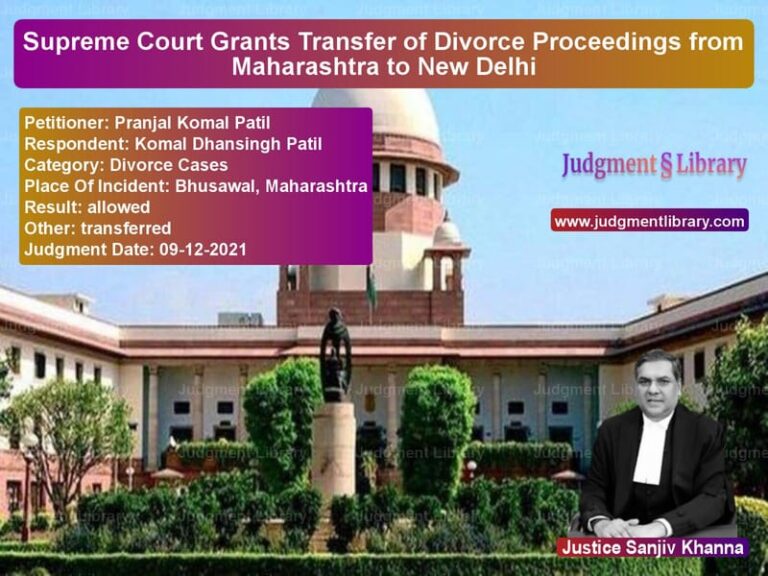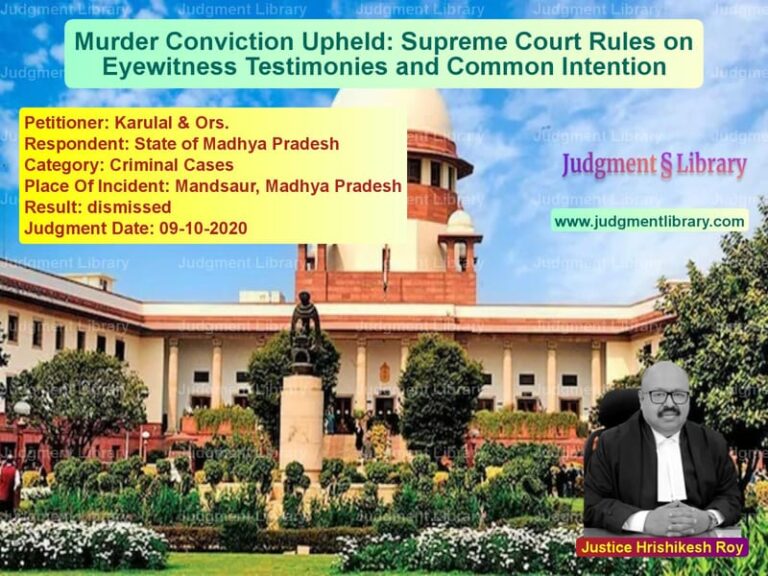Selvakumar v. Manjula & Anr.: Analysis of Bonded Labour Case and Appeal Against Conviction
The case of Selvakumar versus Manjula and another revolves around allegations of bonded labour and the subsequent conviction of the appellant under the Bonded Labour System (Abolition) Act, 1976, as well as the Scheduled Castes and Scheduled Tribes (Prevention of Atrocities) Act, 1989. The appellant was initially acquitted by the Sessions Court, but the High Court reversed this decision and convicted the appellant. The Supreme Court of India has now reviewed the case, considering the legal aspects surrounding the conviction and the imposition of penalties under these two Acts.
The appellant, Selvakumar, is accused of being involved in the forced employment of workers at a rice mill run by his deceased father. The case stems from a raid conducted in March 2006, where bonded labourers were found working in the rice mill. A complaint was filed, leading to an investigation and the subsequent charging of the appellant and his father, Accused No. 1, under the Bonded Labour System (Abolition) Act. The prosecution claimed that these workers were forced to work without receiving due wages, thus violating the provisions of the Act.
The prosecution argued that the appellant, as the son of the owner, had control over the operations of the rice mill, including the exploitation of the workers. They presented evidence from witnesses who testified that they were employed at the rice mill under conditions of bonded labour. The prosecution relied on the testimonies of these witnesses and documents from the District Revenue Officer and the police to establish that the appellant was guilty of enforcing bonded labour.
The defence, on the other hand, argued that the appellant was not involved in the day-to-day operations of the rice mill and that there was no evidence linking him directly to the acts of forced labour. They further contended that the prosecution had failed to establish that the workers were, in fact, bonded labourers. The appellant’s counsel also questioned the reliability of the evidence presented by the prosecution, arguing that the testimonies of the witnesses were inconsistent and lacked corroboration.
The Sessions Court, after reviewing the evidence, acquitted the appellant, citing a lack of sufficient evidence to prove that the appellant was involved in the forced labour or had control over the rice mill. However, the acquittal was appealed by Manjula (PW-6), a bonded labourer, to the High Court. The High Court reversed the acquittal, convicting the appellant under Sections 16 and 17 of the Bonded Labour System (Abolition) Act. The High Court found that the evidence presented by the prosecution was credible and that the appellant had indeed played a role in the exploitation of the workers.
The appellant then approached the Supreme Court, challenging the High Court’s decision. The primary issue raised in the appeal was whether the appellant had any involvement in the enforcement of bonded labour, and whether the High Court’s conviction was based on reliable and sufficient evidence. The appellant’s counsel argued that the High Court had wrongly convicted him based on assumptions and circumstantial evidence, without proving his direct involvement in the crime. They contended that the prosecution had failed to establish the appellant’s role in the rice mill’s operations and that the conviction was unwarranted.
The Supreme Court, in its judgment, considered the arguments of both the appellant and the respondents. The Court noted that while the prosecution had presented evidence of the existence of bonded labour at the rice mill, the critical issue was whether the appellant had been involved in compelling the workers to work under such conditions. The Court emphasized that for a conviction under the Bonded Labour System (Abolition) Act, it was necessary to establish that the accused had directly participated in or enforced the conditions of bonded labour. The Court found that there was insufficient evidence to prove that the appellant had compelled the workers to work under the conditions described by the prosecution.
Despite finding the appellant not guilty of the crime, the Supreme Court acknowledged the serious nature of the allegations and the evidence presented by the prosecution. The Court noted that the rice mill, operated by the appellant’s deceased father, had employed workers under exploitative conditions, which was in violation of the principles underlying the Bonded Labour System (Abolition) Act. The Court concluded that while the appellant was acquitted of the charges under Sections 16 and 17 of the Act, the issue of compensation for the victims remained unresolved.
As a result, the Court directed that the appellant pay a compensation of Rs. 50,000 to each of the workers who had been exploited under the conditions of bonded labour. The Court ordered that this compensation be paid within three months, acknowledging the financial hardship faced by the victims due to their exploitation. The Court’s decision highlights the importance of holding individuals accountable for their actions in cases of bonded labour while also recognizing the need for compensation and restorative justice for the victims.
The judgment delivered by the Supreme Court has broader implications for the application of the Bonded Labour System (Abolition) Act and the rights of bonded labourers in India. The case underscores the importance of robust evidence and fair judicial processes in convicting individuals accused of crimes related to forced labour. The Court’s direction to compensate the victims also sets a precedent for future cases involving bonded labour, ensuring that victims are provided with some form of financial relief even when the accused are acquitted.
Petitioner Name: Selvakumar.Respondent Name: Manjula & Anr..Judgment By: Justice A.S. Bopanna, Justice Pamidighantam Sri Narasimha.Place Of Incident: Tamil Nadu.Judgment Date: 19-09-2022.
Don’t miss out on the full details! Download the complete judgment in PDF format below and gain valuable insights instantly!
Download Judgment: selvakumar-vs-manjula-&-anr.-supreme-court-of-india-judgment-dated-19-09-2022.pdf
Directly Download Judgment: Directly download this Judgment
See all petitions in Murder Cases
See all petitions in Bail and Anticipatory Bail
See all petitions in Fraud and Forgery
See all petitions in Theft and Robbery Cases
See all petitions in Custodial Deaths and Police Misconduct
See all petitions in Judgment by A. S. Bopanna
See all petitions in Judgment by P.S. Narasimha
See all petitions in allowed
See all petitions in supreme court of India judgments September 2022
See all petitions in 2022 judgments
See all posts in Criminal Cases Category
See all allowed petitions in Criminal Cases Category
See all Dismissed petitions in Criminal Cases Category
See all partially allowed petitions in Criminal Cases Category







